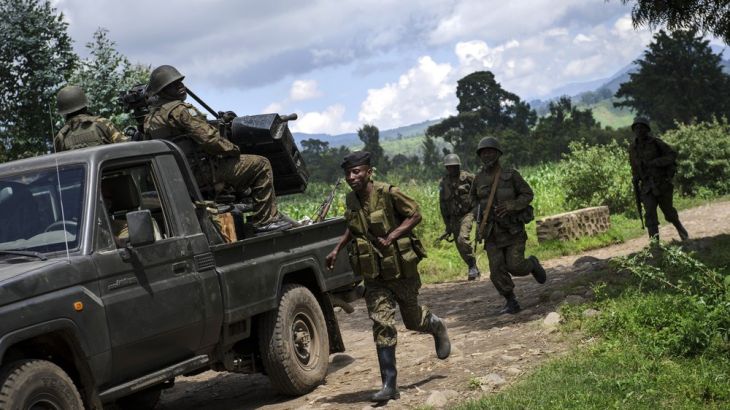
Is history repeating itself in DR Congo?
As fighting rages in eastern DRC, we ask why the international community is not doing more to stop the violence.
Conflict has once again broken out in the eastern region of the Democratic Republic of Congo (DRC). Fighting between government forces, dissident groups and militias has been raging for almost a month in this country that is no stranger to violence.
The DRC’s violent history appears to be repeating itself.
|
“The issue not Bosco. The issue is how can a government that has the support of the international and regional community fail to bring sanity in its own backyard? Fundamentally the government has problems within itself.“ – Yussa Bunvigiye of the Congo Global coalition |
For almost two decades, ethnic rivalries have led to fighting across the country’s eastern border.
The conflict began in neighbouring Rwanda with the 1994 genocide. It drew the DRC into the deadliest war in African history. The country became a killing field, featuring troops from six African nations. Nearly five million people died – killed by war and starvation.
An uneasy calm was restored in 2003. But peace was short-lived and conflict resurfaced five years later.
The man accused of instigating the current violence is General Bosco Ntaganda, nicknamed The Terminator. He is a DRC army general and former militia leader who is sought by the International Criminal Court (ICC) for recruiting child soldiers.
Thousands have fled their homes and villages, heading either to the Nkamira transit camp in Rwanda, some 20km from the DRC border, or to camps on the Congolese side of the border.
|
“How can you think that corruption is an opportunity to start a war? If anybody, anywhere finds that the problem of corruption allows people to land in war then we should have war everywhere in the world.“ – Lambert Mende Omalange, the Congolese communications minister |
The UN has warned about the risks of sexual violence during this latest round of violence and has called on the government of the DRC to protect civilians against it.
Inside Story asks: Is the troubled nation on the way to yet another lengthy and bloody conflict? And why is the international community not doing more to stop the violence?
Joining presenter James Bays to discuss these issues are guests: Yussa Bunvigiye of the Congo Global coalition, which is an alliance of humanitarian, human rights and environmental organisations specialising in the DRC; Anneke Van Woudenberg, a senior Africa researcher for Human Rights Watch who has worked in the DRC for 13 years; and Lambert Mende Omalange, the DRC’s minister of communication.
|
“One of the major reasons behind the mutiny was the fact that Bosco Ntaganda was coming under the spotlight, there were increasing calls for his arrest.” Anneke Van Woudenberg, a senior Africa researcher for Human Rights Watch |
WHO IS BOSCO NTAGANDA?
The Congolese government blames one man, General Bosco Ntaganda, for masterminding the uprising. He is accused of committing crimes against humanity. Ntaganda is the former commander of the National Congress for the Defence of the People, an armed militia operating in the country’s northern Kivu province. He is wanted by the ICC for allegedly using child soldiers in an earlier conflict. Human Rights Watch says he has recruited dozens more children since April. Ntaganda is now accused of leading the mutiny against the Congolese army.
HUMANITARIAN CRISIS IN THE DRC:
- The conflict in the DRC – which some call Africa’s world war – ended in 2003 but left the country in the grip of a humanitarian crisis. That war claimed as many as five million lives as a result of fighting and starvation.
- More recent statistics on the humanitarian crisis are just as grim. The UN’s refugee agency says more than 1.7 million Congolese people are internally displaced persons.
- Following the most recent violence, thousands of refugees have fled the country in the east. More than 12,000 have fled to Uganda since the end of last year, and many thousands have crossed over to Rwanda.
- The high rate of sexual violence is a major concern. Last year, the American Journal of Public Health estimated that as many as 1.8 million Congolese women have been raped.